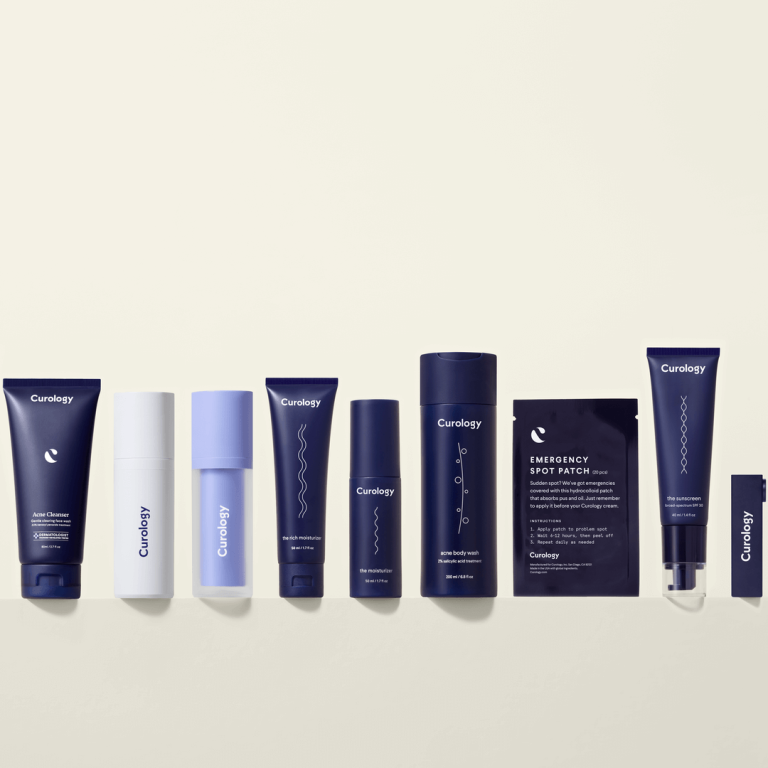How it works:
Share your skin goals and snap selfies
Your dermatology provider prescribes your formula
Apply nightly for happy, healthy skin
How it works:
How it works:
Share your skin goals and snap selfies
Your dermatology provider prescribes your formula
Apply nightly for happy, healthy skin
How it works:
Is Vaseline good for your lips? Here’s how it works
Surprise: Petroleum jelly may help seal in moisture.



When it comes to Vaseline, you may have heard mixed reviews. While some call it a miracle salve, the flip side claims it may do more harm than good. So, we asked our dermatology providers to get to the bottom of this debate and let us know their thoughts. Is Vaseline good for your lips and skin? Here’s what you need to know.
What is Vaseline, and how does it work?
First created in 1870, Vaseline (aka petroleum jelly, mineral oil jelly, or petrolatum) was initially promoted as a topical ointment with healing properties. Primary care physicians still use it today to manage early-stage eczema, psoriasis, and actinic keratoses,¹ but its potential benefits don’t stop there! When used topically, it forms a protective barrier that helps lock existing moisture into the skin and lips, preventing moisture loss. Vaseline isn’t a humectant, meaning it doesn’t add moisture to the lips or skin—it just seals it in. One of the most effective occlusive moisturizers on the market, Vaseline can reduce water loss through the skin by nearly 99%.²
Using Vaseline on your lips
Dry, chapped, cracked lips are a common skin concern for many, especially during the winter months. Widely used as an inexpensive, effective lip balm, Vaseline is a safe way to help lock moisture and hydration into your lips. That said, as noted above, it won’t add moisture, which is why you should hydrate your lips first if they’re dry.To use Vaseline on your lips, apply a thin layer using your finger or a cotton swab. For a healthy, hydrated pout first thing in the morning, leave it on overnight.
What else is Vaseline used for?
When it comes to Vaseline, lip balm is just one of its many uses. A multi-tasker in the skincare world, petroleum jelly is a favorite among many dermatology and medical providers. Here are a few additional uses for Vaseline that you may want to consider:
It may help prevent infection: Vaseline is often used to prevent skin infections after some types of ambulatory surgeries.³
It may help repair your skin barrier: A recent study shows that Vaseline accelerated skin barrier repair following damage caused by acetone.⁴
It may help treat atopic dermatitis: Many dermatology providers recommend Vaseline to patients with this common chronic skin disorder.⁵
It may help relieve dry skin: Vaseline may help relieve flaking, itching, and cracking associated with dry skin. The American Academy of Dermatology recommends applying it while your skin is damp.⁶
It may help heal minor wounds: Apply Vaseline to minor cuts, scrapes, and scratches to keep the wound moist. This helps prevent the wound from drying out and may also help prevent scarring.⁷
It may help prevent chafing: If you’re experiencing chafing from two parts of your body rubbing together uncomfortably, Vaseline may help prevent painful friction and irritation.
It may help keep your nails healthy: Apply Vaseline to your nails and cuticles between manicures and pedicures to lock moisture in and help prevent chipping. Apply to damp nails for the best results.
Mix and match with Vaseline
A great way to enhance the potentially positive effects of Vaseline on your lips is to apply a different hydrating lip balm beforehand. Curology’s intuitive, one-handed lip balm locks in lasting moisture and is made with non-pore-clogging, acne-friendly ingredients. It’s vegan and available with SPF. If you have chapped lips, our dermatology providers recommend using lip products that contain the following ingredients before applying Vaseline:
Jojoba oil
Jojoba oil is a humectant, meaning it attracts water to your skin and can help it stay hydrated. It’s a popular moisturizing ingredient in many skincare products and can also be applied directly to your lips and skin without needing to dilute it in a carrier oil. It’s also non-comedogenic, meaning it won’t clog your pores. Jojoba oil is one of our favorites, which is why we use it in the Curology lip balm.

Shea butter
Shea butter is a powerful moisturizer that contains several essential fatty acids as well as antioxidants. Deeply hydrating, it’s a very common ingredient in many skin and lip care products, and it may also have antioxidant and anti-inflammatory properties.⁸
Hyaluronic acid
This dermatologist-favorite ingredient is the cornerstone of many different anti-aging products. Hyaluronic acid helps attract moisture to your skin to provide the deep, long-lasting hydrating nourishment your lips crave. A potent humectant, hyaluronic acid absorbs 1,000 times its weight in water.⁹ Look for it in lip balms and masks as well as serums and creams.
Potential Vaseline side effects
Petroleum jelly is typically well tolerated, but, like with any new topical ingredient or product, allergic reactions are possible. If you have sensitive skin concerns about a potential reaction, our experts suggest doing a patch test first to see how your skin reacts. Vaseline can leave a greasy feeling on the lips that some people may not like, which is a personal preference rather than a potential side effect. If you’re wondering, “Does Vaseline clog pores?” The answer is no! It’s labeled as non-comedogenic, which means it doesn’t.
4 skincare ingredients that may dry out your lips
Not all skincare ingredients are created equal! There are a handful of ingredients commonly seen in skincare products that our dermatology providers don’t love because they may contribute to excess dryness. If you’re in the market for a new lip balm and you’re not going with Vaseline, make sure you read the labels and consider avoiding products containing the following:
Citrus
Alcohol
Curology uses effective ingredients

Founded in 2014 by board-certified dermatologists, Curology is a full-service skincare company offering products made with proven effective, clinically backed ingredients. The Curology lip balm, which can be used on its own or along with Vaseline, is excellent for hydrating dry lips. Our prescription-strength products help treat acne, signs of aging, hyperpigmentation, and rosacea. Curology’s dermatology providers can help take the guesswork out of your skincare routine by providing a custom treatment plan and personalized prescription formula to help you meet your skin goals.
Signing up is easy. Just answer a few questions and snap some selfies to help us get to know your skin. If Curology is right for you, we’ll pair you with one of our in-house licensed dermatology providers. The best part? Your personalized prescription formula comes with any of our recommended skincare products.
FAQs
Primary care physicians still use it today to manage early-stage eczema, psoriasis, and actinic keratoses, but its potential benefits don’t stop there! When used topically, it forms a protective barrier that helps lock existing moisture into the skin and lips, preventing moisture loss. Vaseline isn’t a humectant, meaning it doesn’t add moisture to the lips or skin—it just seals it in. One of the most effective occlusive moisturizers on the market, Vaseline can reduce water loss through the skin by nearly 99%.
When it comes to Vaseline, lip balm is just one of its many uses. A multi-tasker in the skincare world, petroleum jelly is a favorite among many dermatology and medical providers. Here are a few additional uses for Vaseline that you may want to consider:
It may help prevent infection: Vaseline is often used to prevent skin infections after some types of ambulatory surgeries.
It may help repair your skin barrier: A recent study shows that Vaseline accelerated skin barrier repair following damage caused by acetone.
It may help treat atopic dermatitis: Many dermatology providers recommend Vaseline to patients with this common chronic skin disorder.
It may help relieve dry skin: Vaseline may help relieve flaking, itching, and cracking associated with dry skin.
Petroleum jelly is typically well tolerated, but, like with any new topical ingredient or product, allergic reactions are possible. If you have sensitive skin concerns about a potential reaction, our experts suggest doing a patch test first to see how your skin reacts.
P.S. We did the homework so you don’t have to:
The power of grease. Journal of the American Academy of Dermatology. (2012).
Harwood, A., et al. Moisturizers. StatPearls. (2022).
Czarnowicki, T., et al. Petrolatum: Barrier repair and antimicrobial responses underlying this "inert" moisturizer. J Allergy Clin Immunol. (2016).
Ghadially, R., et al. Effects of petrolatum on stratum corneum structure and function. J Am Acad Dermatol. (1992).
Baltz, J.O., et al. Petroleum jelly baths: A tip for easy emollient application. Pediatr Dermatol. (2020).
5 ways to use petroleum jelly for skincare. American Academy of Dermatology. (n.d.).
5 ways to use petroleum jelly for skincare. American Academy of Dermatology. Ibid.
Lin, T.K., et al. Anti-inflammatory and skin barrier repair effects of topical application of some plant oils. International Journal of Molecular Sciences. (2017).
Your winter skin survival kit. American Academy of Dermatology.(n.d.).
Erin Pate is a board-certified Family Nurse Practitioner at Curology. She earned her Masters of Science in Nursing at Florida Atlantic University in Boca Raton, FL.
* Subject to consultation. Subscription is required. Results may vary.

Curology Team

Erin Pate, NP-C
Related Articles
How to use acne body wash correctly: Your straightforward guideMen skin care: top concernsHow to get rid of body and back acne?Face sunscreen for sensitive skinSunscreen for eyes: How to protect your delicate skin from UV raysPopular Articles
Ask Curology: Is my cold breaking me out?Slugging: The dermatologist-approved skincare hack going viral on TikTokTretinoin vs retinol: What’s the difference?How to create a self-care routine that actually sticksYour 2023 skincare horoscopeTry prescription skincare
Get routine essentials

Good skin days ahead
- Breakouts
- Redness
- Fine lines
- Dark spots
- Hair thinning